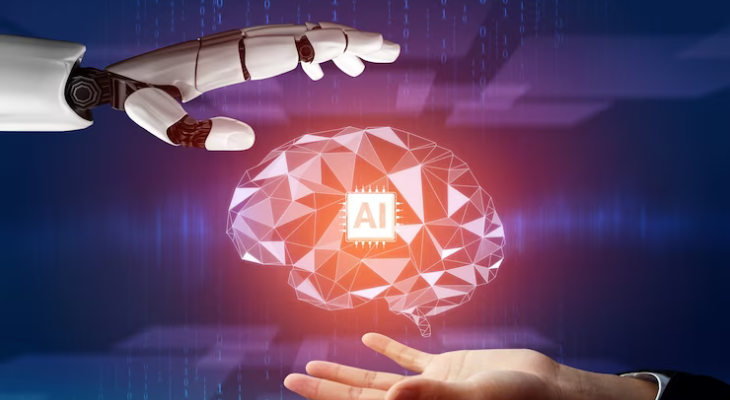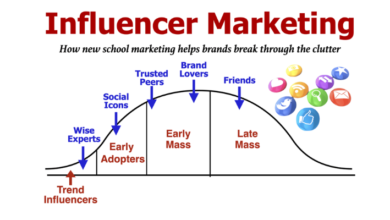The Future of Digital Marketing: Trends to Watch in 2023

Welcome to the ever-evolving world of digital marketing! In today’s digital landscape, staying updated with the latest trends is crucial for businesses striving to stand out from the competition. As we dive into 2023, several exciting trends are set to shape the future of digital marketing. In this article, we will explore these trends in detail to provide you with valuable insights on how to adapt and thrive in the dynamic realm of digital marketing.
I. Artificial Intelligence in Marketing

Artificial Intelligence (AI) is revolutionizing the marketing industry, enabling businesses to leverage advanced algorithms and data analysis for smarter decision-making. AI is increasingly being used to improve digital marketing strategies, with its ability to analyze vast amounts of data and generate valuable insights. By adopting AI in marketing, businesses can enhance their conversion rates and overall customer experience.
One key area where AI shines is in personalized marketing campaigns. By utilizing AI-powered analytics, businesses can gain valuable insights into customer behavior and preferences, allowing them to create tailored experiences and deliver highly relevant content to individual users. This level of personalization enhances the customer engagement and increases brand loyalty.
II. Voice Search Optimization
The popularity of voice search continues to rise, with more consumers relying on voice assistants such as Siri, Alexa, and Google Assistant to find information and make purchases. Optimizing websites for voice search has become paramount for businesses aiming to capture this growing market.
To optimize for voice search, businesses should focus on using long-tail keywords and creating content that directly answers common user queries. By incorporating natural language and providing concise, helpful answers, websites can increase their chances of ranking higher in voice search results and attract valuable organic traffic.
III. Personalization and Customization
In an era of information overload, personalization has emerged as a key differentiator for businesses. Customers respond positively to personalized digital marketing messages, with studies showing that personalized experiences have a significant impact on purchasing decisions.
To harness the power of personalization, businesses should invest in robust customer data analysis tools. By understanding customer preferences, purchase history, and browsing behavior, companies can deliver highly targeted recommendations and offers. Moreover, personalized email campaigns have been found to generate higher transaction rates. Leveraging automation and AI-driven insights, businesses can create unique customer journeys that foster deeper engagement and drive conversions.
IV. Augmented Reality in Marketing
Augmented Reality (AR) has transformed the way businesses engage with customers, providing immersive experiences that bridge the gap between the digital and physical worlds. AR experiences have been found to increase customer satisfaction and influence purchasing decisions.
Brands can leverage AR technology to offer virtual try-on experiences, interactive product demonstrations, and engaging storytelling. By integrating AR into e-commerce platforms, businesses can provide customers with a realistic preview of products, enhancing their confidence and reducing purchase hesitation. The seamless integration of AR into marketing campaigns opens up new avenues for creativity and deeper customer engagement.
V. Chatbots and Conversational Marketing
As consumers increasingly seek instant solutions and personalized experiences, the use of chatbots and conversational marketing has gained momentum. Chatbots offer businesses a scalable way to provide 24/7 customer support, gather customer information, and offer personalized recommendations.
Chatbots use natural language processing in digital marketing and AI algorithms to engage in dynamic and meaningful conversations with customers. This allows businesses to resolve customer queries, provide real-time assistance, and deliver relevant information. Implementing chatbots in marketing strategies can significantly improve customer satisfaction, boost engagement, and drive conversions.
VI. Influencer digital marketing
Influencer marketing continues to be a powerful strategy for brands to reach and engage with their target audiences. Collaborating with relevant influencers can significantly amplify brand awareness and credibility.
Identifying and partnering with influencers whosevalues align with the brand can help businesses effectively promote their products or services to a highly engaged audience. Influencer marketing allows businesses to leverage the trust and influence of these individuals to create authentic and compelling content. By selecting the right influencers and ensuring transparent collaborations, brands can build stronger connections with their target market and drive measurable results.
VII. Video Marketing
Video marketing has become a dominant force in digital advertising, capturing the attention of audiences across various platforms. Videos have proven to be highly engaging and memorable, leading to higher message retention compared to other forms of content.
Businesses can leverage video content to tell compelling stories, showcase product demonstrations, and engage with their audience in a more immersive manner. With the rise of short-form video platforms and live streaming, brands have ample opportunities to create authentic and engaging content that resonates with their target market. Incorporating video marketing into strategies can help businesses effectively communicate their message and leave a lasting impact on viewers.
VIII. Data-Driven Marketing
Data is the foundation of effective marketing strategies in the digital age. By collecting and analyzing customer data, businesses gain valuable insights into consumer behavior, preferences, and buying patterns.
Data-driven marketing allows businesses to develop targeted campaigns, optimize digital marketing efforts, and improve overall customer experiences. It involves leveraging tools and technologies that enable data collection, analysis, and interpretation. By understanding their audience better, businesses can tailor their messages and offerings to meet specific needs and drive more meaningful engagements.
IX. Mobile Marketing
Mobile devices have become an integral part of consumers’ lives, presenting immense opportunities for businesses to connect with their target audiences. Mobile marketing involves optimizing websites, ads, and content for mobile devices to deliver a seamless and user-friendly experience.
To maximize the impact of mobile marketing, businesses must ensure responsive design, fast-loading pages, and intuitive user interfaces. Mobile marketing also includes location-based marketing, which allows businesses to deliver targeted offers and promotions to consumers based on their geographic location. By adapting to the mobile-first mindset, businesses can effectively engage with their audience and drive conversions.
X. Social Media Advertising
Social media platforms continue to dominate the digital landscape, providing businesses with powerful tools to reach and engage with their target audiences. Social media advertising allows businesses to create highly targeted campaigns and deliver personalized content to specific audience segments.
To maximize the impact of social media advertising, businesses should identify the platforms most relevant to their target demographics and create engaging content tailored to each platform’s unique features. Leveraging advanced targeting options, such as demographic filters and interest-based targeting, businesses can reach specific audience segments and increase the effectiveness of their campaigns.
XI. Customer Experience and Engagement
In today’s highly competitive marketplace, delivering exceptional customer experiences and fostering meaningful engagements are crucial for long-term success. Customer experience encompasses every interaction a customer has with a business, from the first touchpoint to post-purchase support.
Businesses must prioritize providing seamless and personalized customer experiences across all touchpoints. This involves leveraging technologies such as AI-powered chatbots, personalized recommendations, and omnichannel communication to create cohesive and delightful customer journeys. By placing the customer at the center of their strategies, businesses can cultivate loyalty, advocacy, and sustainable growth.
XII. Automation in Marketing
Marketing automation offers businesses the ability to streamline repetitive tasks, optimize workflows, and deliver personalized experiences at scale. By automating processes such as email marketing, lead nurturing, and customer segmentation, businesses can save time and resources while delivering timely and relevant messages to their audience.
Implementing marketing automation tools and platforms allows businesses to focus on strategic initiatives, data analysis, and customer relationship building. Automation can improve efficiency, enhance customer experiences, and drive better overall outcomes. By adopting marketing automation, businesses can allocate more time and resources towards strategic initiatives and create meaningful connections with their customers.
Conclusion:
The future of digital marketing in 2023 is marked by innovation, personalization, and seamless customer experiences. By embracing trends such as artificial intelligence, voice search optimization, personalization, augmented reality, and chatbots, businesses can stay ahead of the curve and connect with their audiences in meaningful ways. Additionally, incorporating influencer digital marketing, video marketing, data-driven strategies, mobile optimization, social media advertising, and automation can further enhance marketing efforts and drive tangible results.
Frequently Asked Questions (FAQs) on Digital Marketing Trends in 2023:
What are the top digital marketing trends for 2023?
The top digital marketing trends for 2023 include the use of artificial intelligence (AI) in marketing, voice search optimization, personalization and customization, augmented reality (AR), chatbots and conversational marketing, influencer marketing, video marketing, data-driven marketing, mobile marketing, social media advertising, customer experience and engagement, automation in marketing, content marketing strategies, e-commerce and online shopping trends, blockchain technology in marketing, and virtual reality (VR) in marketing.
How can AI be used in digital marketing?
AI can be used in digital marketing to enhance marketing strategies, analyze data for insights, and personalize marketing campaigns. AI-powered tools and algorithms can automate tasks, optimize targeting and segmentation, and provide valuable customer behavior insights for better decision-making.
What steps can businesses take to optimize for voice search?
To optimize for voice search, businesses can focus on using long-tail keywords and creating content that directly answers common user queries. Incorporating natural language and providing concise, helpful answers can increase the chances of ranking higher in voice search results. It’s also important to ensure that websites are mobile-friendly and have fast-loading pages for a seamless voice search experience.
How can personalized marketing benefit customer engagement?
Personalized marketing allows businesses to deliver highly targeted content and recommendations to individual customers based on their preferences and behaviors. This level of personalization enhances customer engagement by providing relevant and tailored experiences, which leads to increased customer satisfaction, improved brand loyalty, and higher conversion rates.
What are the key considerations for implementing augmented reality in marketing campaigns?
When implementing augmented reality in marketing campaigns in digital marketing, businesses should consider factors such as the target audience, the specific goals of the campaign, the level of interactivity desired, and the integration of AR technology with existing platforms or channels. It’s important to create AR experiences that align with the brand’s message and offer value to the customers.





2 Comments